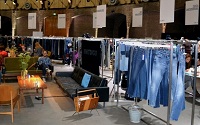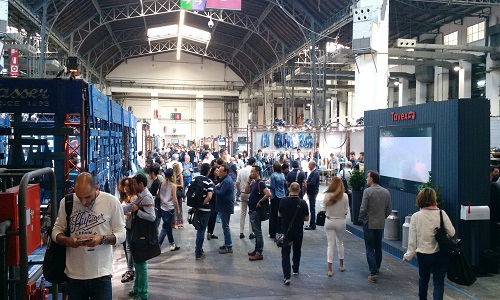"The push and pull between rigid and stretch, authentic and performance, and fast and handcrafted played out at Kingpins Amsterdam and Denim Première Vision, where a global blend of mills, trim suppliers and other elements of the denim supply chain came together to present their Autumn/Winter 2018-2019 collections and innovations. Anchoring each of these themes was a heightened awareness for sustainability as mills debuted new efforts to save water, reduce chemicals and increase the use of sustainable fibres like Tencel, BCI cotton, recycled polyester and other post-consumer fibres."

The push and pull between rigid and stretch, authentic and performance, and fast and handcrafted played out at Kingpins Amsterdam and Denim Première Vision, where a global blend of mills, trim suppliers and other elements of the denim supply chain came together to present their Autumn/Winter 2018-2019 collections and innovations. Anchoring each of these themes was a heightened awareness for sustainability as mills debuted new efforts to save water, reduce chemicals and increase the use of sustainable fibres like Tencel, BCI cotton, recycled polyester and other post-consumer fibres.

For most mills at the shows, sustainability began with new techniques that save water, and ultimately money. In fact, Denim Première Vision’s fashion team called water-less technology as a key theme in its Autumn/Winter 18-19 Denim Tastings seminar, pointing out that these innovations are creating new design possibilities.
Greening growth pastures
At Denim Première Vision, Mexico-based mill Global Denim touted its Ecoljean technology. While a regular pair of jeans passes through six washes and takes an average of 20 litres of water to produce, Ecoljean process requires no water discharging, less energy consumption, less dye consumption and creates a smaller CO2 footprint. The result is an efficient product with less colour variation and a better wash down effect.
In Amsterdam, where the cost of sustainability was a hot topic during Kingpins Transformers, Garmon Chemicals rolled out Geopower NPS, the company’s newest effort to establish strong and effective R&D that sets a new standard for sustainable practices. Short for ‘no pumice stone,’ the new technology achieves rich heritage looks on denim and creates a range of stonewash effects, panel and seam abrasion, high color loss and contrasts. The technology, which has already been implemented by denim brand Only’s R&D program, produces zero pumice sludge and radically cuts environmental impact (especially water) and costs.
Kassim introduced denim that helps clean air pollution. The mill collaborated with an Italian research partner to produce Photocatalytic Denim containing photocatalytic nano composites to eliminate pollutants by using just natural sunlight. Kassim also teamed up with Bainisha, a biomedical product development company, to create denim for professional athletes. Garments are equipped with sensors that send data about the wearer’s posture and gait to an app accessible on their phone.
Fashion & functionality at its best
At Kingpins Amsterdam, Artistic Milliners and its Dubai-based garment and finishing innovation lab, presented denim made with the mission to make each step as sustainable and traceable as possible, from thread to rivet. The end product was a jean made with organic cotton, recycled cotton, recycled polyester and Lycra, finessed with sustainable rivets and sustainable leather back patch.
Denim’s reliance on sustainable and performance fibres was evident at both European shows. Going into the new season, Denim Première Vision’s trend team said BCI cotton is the most frequent proposal, followed by organic cotton and recycled polyester. Meanwhile, mills turned to fibres from Invista and Lenzing to create stretch and authentic looks that satisfy the market’s demand for recovery, softness and durability. US Denim partnered with Invista to create SelvedgeX, a range authentic selvedge with built-in comfort and performance. The denim is made with a collection of antique selvedge looms, incorporating Lycra XFit technology for freedom of movement, controlled shrinkage and shape recovery.
Innovations galore
Artistic Milliners Garments and Finishing used Tencel and Lenzing Modal as a springboard for its new PP-free ‘sustainable softness’ Haptic collection. The eco fabrics, designed to offer softness, moisture management and breathability, combines laser technology and other treatments to achieve a localized effect. For instance, ozone technology enhances Haptic’s sanitizing and disinfecting properties, while Jeanologia’s E-flow technology creates high and low effects. Inspired by the Nordic ‘hygee’ movement—a trend based on cozy and comfortable living—Artistic Milliners presented Sunday Jeans. The fabrications incorporate Tencel, Lenzing Modal and fiber dyed modal for a soft look and feel. The fabric is suitable alternative to leggings for mellow weekends.
Soorty sees demand for more application of denim in the activewear market. The mill rolled out Denim Active, a bi-stretch Tencel and organic cotton concept based on second skin silhouettes. The collection, offered in three variants, delivers an index of performance qualities, including freedom of movement, quick dry, soft touch and moisture management. A version with Coolmax All Season is designed to keep the wearer cool and dry on hot days and warm on cold days. A version with Coolmax Eco-Made is made with 97 per cent recycled resources and provides moisture wicking properties. Denim Active made with Thermolite IR raises the temperature of the garment and absorbs NIR through solar-activated technology.
Arvind draws the focus on India
Jelt denim found a place in mills’ collections for A/W 18-19. The heritage workwear fabric was adopted in large scale by HD Lee Company in the 1920s. Known for using better quality, longer staple yarns, the denim became a staple for workwear brands and sailors. Arvind reconsidered Jelt denim, recreating a faithful reproduction of the original 2×1 weave—complete with shuttle loom versions with selvedge and grey heather weft—with contemporary fibers. The mill added performance to Jelt 2.0, with versions made with Lycra fiber, Tencel and Coolmax.
Arvind introduced Faux Denim, a collection of denim fabrics with a leather finish. The mill says coatings are resistant to cracking. Artistic Milliners introduced easy-care Aloe Vera finishing with freshness and moisturizing properties. The smooth and silky finish can be applied to a variety of blends, including Tencel and Cordura. Colour and wash stories spanned intense to authentic. To satisfy true indigo lovers, Arvind presented Azurite, a line of premium fabrics made with a patented technology that uses indigo dyed weft and warp yarn. The result is saturated blue fabrics with unique wash downs.












